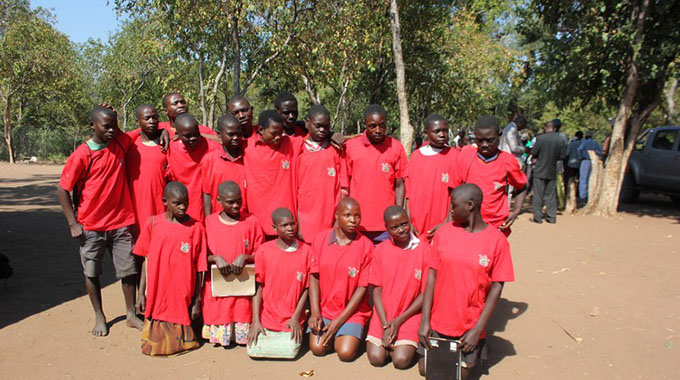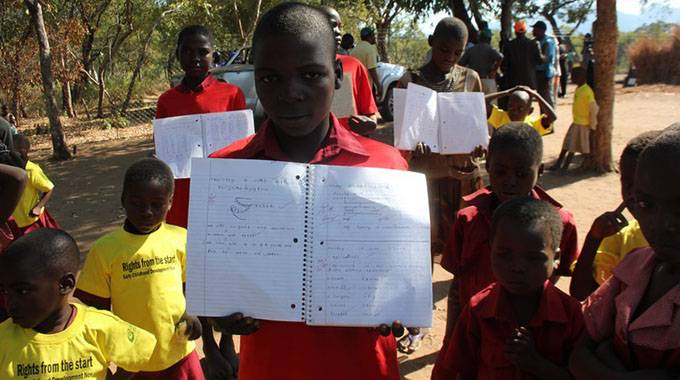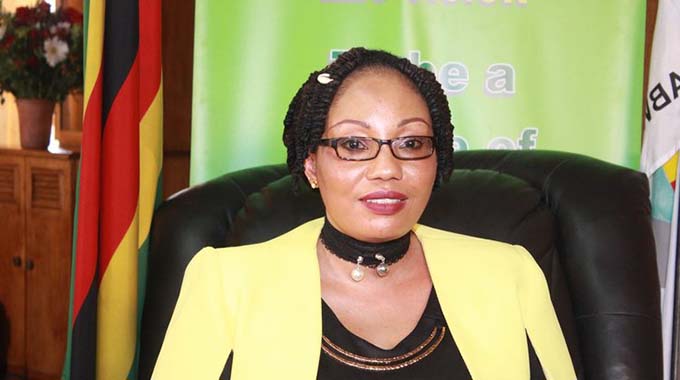Govt keen to support Doma people

Rumbidzai Ngwenya Features Writer
The faces of children at Mariga Government School, down in Mbire District of Mashonaland Central Province, tell a daunting story.
Their skin is so dry and chapped while their clothes are dirty and tattered. They walk to school barefooted. To many outsiders this is heart-rending.
But to them, everything is normal. They are always jovial for having the opportunity to attend school. At 18 years most have never attended school. Seeing visitors who have donated some clothes, shoes and stationery cheers their hearts.
“I don’t eat anything in the morning when I come to school and I don’t take anything to school either. I only eat here at school when there is boiled grain, but if I do not, I eat supper at home,” said one of the pupils, flaunting a new dress and a pair of shoes that she had just received.

A pupil shows off his school work at Mariga Government School
But a donation that has been made by the Education Coalition of Zimbabwe (ECOZI) and its member organisations such as Chiedza Childcare Centre, Zimbabwe Catholics Bishops Conference (ZCBC) Education Commission and Foundation Projects to name a few, has changed her life. At least she now has a decent dress and her first ever pair of shoes at 16. She is happy.
“I am happy that I have a dress and shoes, thank you. But next time when you come back, please bring me some food,” she said as she moves away to celebrate with her peers, who like her have also received some goodies.
Even their parents were happy. One of the parents, Elizabeth Karongwe, hoped to see more assistance coming to both the pupils and the community. Anything of sort can lift them out of dire poverty.
“We have been facing many challenges here without recognition. I must say that we are grateful that we are being remembered like this. We never attended school so it gives us joy to see our children having the opportunity to,” she said.
Even though they wish to give their children a better life, circumstances don’t allow them.

A typical homestead of the Doma people
“We have no means of earning a living out here, with lack of inputs and poor rains here we only grow enough to eat. Although we grow vegetables that we sell across Zambia, it’s not enough to provide good food and clothes for our children. We need help.”
After the Ministry of Primary and Secondary Education in Mashonaland Central Province proposed that ECOZI visit Mariga to familiarise themselves with the challenges the school was facing, the team organised to donate a few goodies, clothes, stationery and shoes for the children, for a start.
Although the donations brought cheer to the children, the coalition noted that for the Doma children to be able to fully exercise their right to education, a lot of issues needed to be addressed for the community at large.

An ECD block being constructed at Mariga Government School. — Pictures by Rumbidzai Ngwenya
As it stands, the Doma still face an uphill battle to integrate with the rest of the nation and to survive as a community. They have to survive the prevailing harsh economic situation.
They have no easy access to basic needs such as food, shelter and clothing. And the coalition believed it hindered the children to excel.
ECOZI national director Mr Maxwell Rafomoyo said there was need for the Government and civic society to work together to support the Doma people to fully embrace education. Without support, their access to education would not yield the desired results.
“Education being multi-sectoral, issues of social safety nets, health and any other that cuts across can’t be ignored if we are to ensure quality education to the Doma children,” he said.
“The Doma people have in the past been left out in almost every economic and social aspect and it’s important that the Government is taking an initiative to engage them. For years even since after independence there has not been a school in Mariga.
“But now things are different. The Government has taken over the initiative of building a school for them.”
But even though the founding of the school has offered the Doma children an opportunity to access education, it is such issues as lack of food, stationery, clothing, to name but just a few, that are preventing many from attending daily classes. During the day of the visit, of the about 251 enrolled pupils, only about a hundred were present.
“As ECOZI we have started a campaign that we want to sustain to help the Doma people enjoy the same economic and social rights like anyone else. We are assisting wherever possible,” said Rafomoyo.
The coalition aims to promote inclusive and equitable education and the distribution of resources.
The Ministry of Primary and Secondary Education acknowledged that the establishment of the school in Mariga was the first step to ensure development of the Doma people but emphasised that more had to be done.
Edington Maodzwa, a ministry official, encouraged people and organisations to support the Doma people in every way possible.
“There is still a lot to be done in Mariga and other Doma communities as schools are few. Although we have managed to set up a school which we are still developing in Mariga, the status of the children’s welfare is troubling,” he said.
“The children do not have decent clothing, shoes, stationery and most of them come to school on an empty stomach. These are the issues that we also want to address as the ministry but any help is most welcome.
“We are also looking forward to a sustainable schools feeding programme, in that way we will be certain that the children concentrate in their school work.”
The Doma people still face numerous hardships. The scarcity of schools in the area and general underdevelopment need attention. First Lady Auxillia Mnangagwa has visited the area and hopes are high that President Mnangagwa’s administration will do more to uplift their lives.
Plans are already underway to build roads and a bridge at Mwazamutanda River which is impassable during the rainy season. Healthcare facilities also need to be built to improve the quality of life of the Doma people. And with more attention being given to the area, the Doma people will certainly sing a new song of hope.







Comments